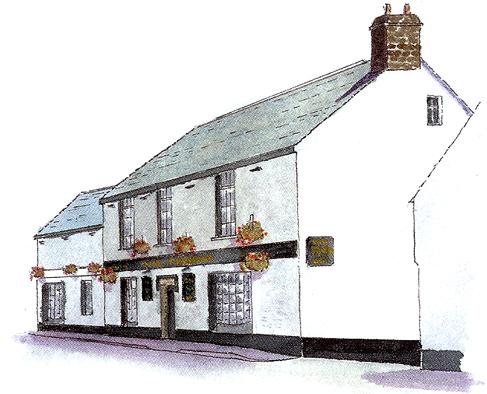The Foxhound
|
Our village pub has a vibrant history. Our thanks go to Edward Boyle for his illuminating efforts in recording a fine story that is part of this. Located at the centre of the village beside the A379 Plymouth to Kingsbridge road, 'The Foxhound' is a typical English roadside public house, which has served the Brixton community and travelling public for more than 200 years. It provides a friendly environment in which to enjoy lunch or dinner offering a good selection of traditional pub fare and a choice of beers, wines and spirits. There is a 'Foxhound' darts team playing league matches and many special event evenings are held for the entertainment of locals and visitors alike. 'The Foxhound' was providing beer, food and shelter for travellers long before the age of the motorcar, when the journey from Kingsbridge to Plymouth could take all day. Opposite the pub was 'Mann's' - the Wheel Smith, where horses were shod and carriages repaired whilst their weary passengers rested and enjoyed the warmth of the hostelry. |
In those days, journeying on the muddy track connecting country villages and towns was a hazardous business, thieves and highwaymen roamed the area and many a traveller disappeared forever and many a criminal was hanged on the gibbets erected in Brixton or elsewhere on the route.
There are public houses all over England called the 'Foxhound' or 'Fox and Hounds', indicating their association with foxhunting and - until recently - it was accepted locally that hunting was the original source of this pub's name.
In 1999 Edward Boyle, a local researcher, whilst browsing through HM Customs & Excise Archives, discovered an interesting story relating to the history of the pub. There is some dispute among historians as to the validity of this tale, nevertheless Edward Boyle remains convinced of its accuracy. In the year 2000 the pub sign showing a Foxhound dog was repainted with an illustration of a ship and the 'Foxhound' became the 'Foxhound Clipper'. However, the name and style of the pub reverted to the original format in 2003.
Edward Boyle's findings are as follows:
The Famous Fox Hound
In 1767 sixteen year old Lemuel Parken left his home in Wilmslow, Cheshire, and walked to Portsmouth to join the Royal Navy, not knowing that he would one day create a legend in the village of Brixton in Devon.
With a letter of introduction from Captain Drury, a shipmate of his father the Reverend George Parken, Lemuel was accepted into the Navy as a Volunteer First Class. Having been educated by his father, it did not take long for his superiors to discover he could read and write, was good at mathematics and knew the classics, Greek and Latin. Thanks to his Menorcan mother, he was fluent in Spanish and inherited her swarthy good looks.
His promotion was rapid and at the age of twenty he was rated Master, making him responsible for ship navigation, pilotage and midshipman's training. As such he was the senior warrant officer on board.
A young Cornish Midshipman, Edward Pellew, then came under his care and became this country's most successful frigate captain Sir Edward Pellew, Viscount Exmouth. When Pellew was appointed to his first command he insisted on Lemuel becoming his ship's master and together they spent several years capturing many enemy ships and enjoying the high rewards of prize money.
His fortune made, Lemuel was introduced to Edward Pellew's brother, who was Controller of Customs. Lemuel was invited to leave the Navy and join the Revenue Service as a Commander. His first mission was to clear the Yealm River and its estuary of smuggling and illicit trading with the Bretons. He discovered that their link was a woman known by the colourful name of Black Joan, who was able to signal from the Mewstone at Wembury. So widespread was the smuggling situation at the time that even a Royal Navy frigate had been caught in the act.
Lemuel was given command of an American-built cutter 'The Foxhound', faster and more heavily armed than a normal Customs vessel. Raising a crew from ex-shipmates and using all of their past experience, they discovered the source of the smuggling ring to be at Cofflete Creek at Brixton Torr. One cold wet November night in 1785, the 'Foxhounds' laid an ambush and on the given signal attacked the smugglers, capturing no less than forty of them in Cofflete Creek Mill. The prisoners, including ten Bretons, were brought to trial in the Assize Room above what is now the restaurant of this Public House.
The local magistrate found them guilty and they were submitted for sentence at Plymouth, from whence they were transported to the Colonies for life. Black Joan was banished to Looe Island in Cornwall. So pleased were the authorities with this result that they rewarded Lemuel by giving him the lease of these premises for his own use. He named it 'The Famous Fox Hound Inn' and ran it as a successful coaching inn. In time, the 'famous' was dropped and the origins of the inn became confused with hunting.
Retiring to his mother's birthplace, Es Castell on the island of Menorca, Lemuel lived to the grand old age of eighty-nine and lies buried in the English officers' Cemetery above the town.
Edward Boyle, April 1999

